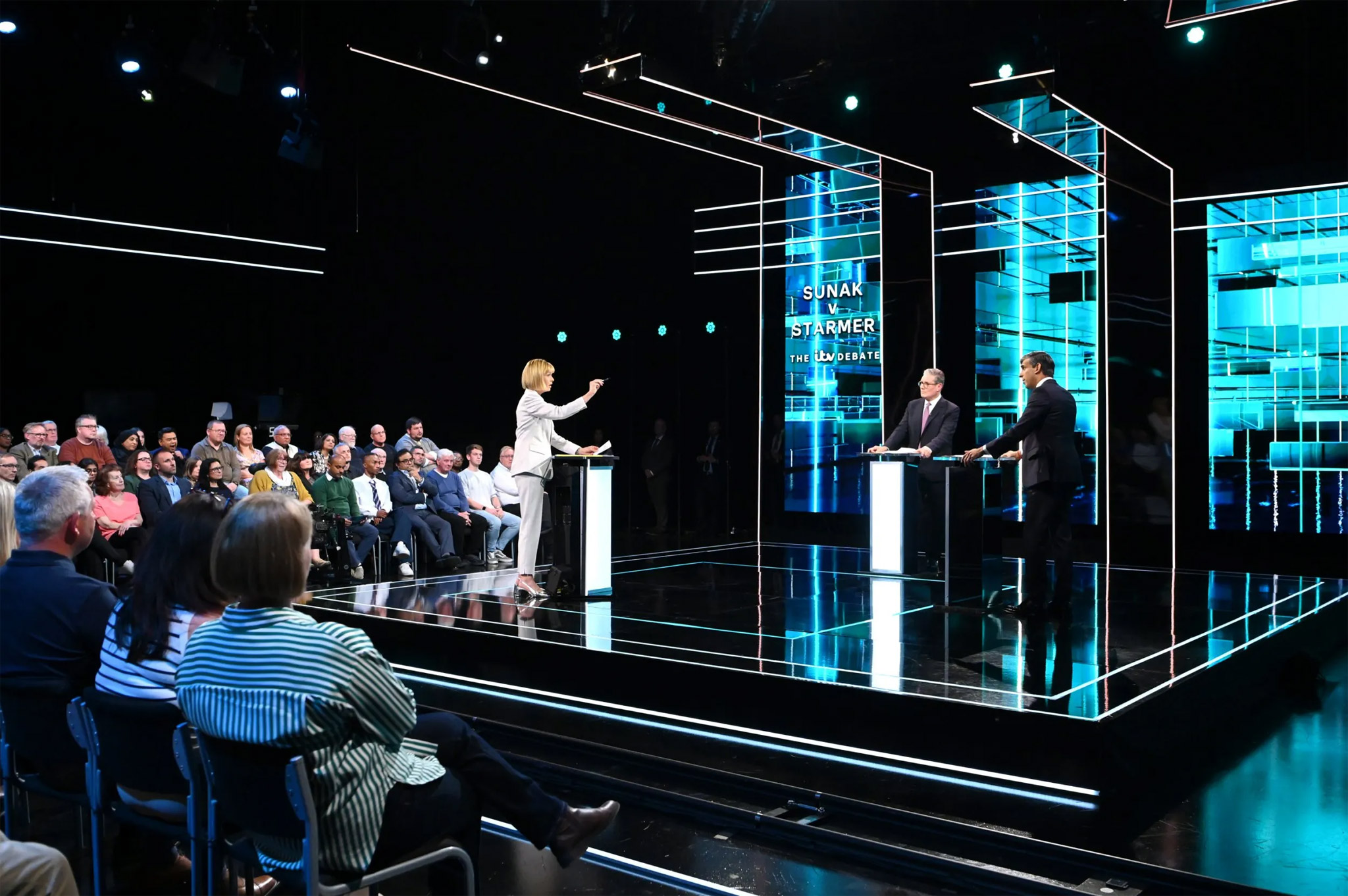
On the night of 4 June, Prime Minister Rishi Sunak and Labour leader Sir Keir Starmer faced off in the first televised debate of the 2024 UK general election campaign.
My wife and I watched it, broadcast live on ITV. I thought it was a very good use of the medium to enable the two primary contenders for leading the next government to show us what they’ve got, their personalities, and their authenticity, in a game or quiz show-type setting where credible one-liners and sound bites are the takeaways people will remember afterwards.
Did they succeed?
Let’s look at the hour-long live session hosted by ITV’s Julie Etchingham. It was hardly a ‘debate’, more of a Q&A with a few prepared questions from people in the live audience plus a few sent in by viewers, all of which Etchingham put to each party leader in turn, limiting their response times to 45 seconds or so.
I did admire her attempts to insist each man keep to the timing in the face of their constant over-running (especially by Sunak) and bullying attempts to talk over each other (they’re politicians, they do this in PMQs all the time, they can’t help themselves! was a running thought in my head).
So it was a somewhat heated exchange that covered key election issues such as taxation, immigration and the European Court of Human Rights, small boats and Rwanda, the NHS, and the cost-of-living crisis.

Sunak’s Conservative Party trails Starmer’s Labour Party by around 20 points in the polls at the moment. It seemed to me that Sunak took a confrontational approach, repeatedly interrupting Starmer and challenging him on Labour’s spending plans. Sunak claimed that Labour’s proposals would mean a £2,000 tax increase per household, which Starmer dismissed as “absolute garbage“.
Starmer, in turn, criticised the Conservatives’ record after 14 years in power and four different party leaders and, thus, Prime Ministers since the last general election in 2019. He highlighted the chaos under Boris Johnson and Liz Truss. He framed the election as a choice between more “chaos and division” with the Tories or “turning the page and rebuilding with Labour”.
The Outcome
So how successful was this event?
As two voters who watched it, my wife and I judged that Sunak edged the lead in terms of how he handled the overall event. Yet, that is purely one metric, and I can’t imagine it would move any needles or dials in any direction.
For my part, I found Starmer more appealing through his lack of a quick retort or repeating a snappy phrase or point to hone in on the party messaging line. There will be time for that, but last night wasn’t it.
Sunak seemed very slippery! I could almost see the brain cogs moving as he listened to Julie Etchingham’s questions as his mind quickly framed an answer.
Helpfully, YouGov conducted a quick poll after the live event finished, interviewing some 1,657 debate viewers.
The poll results show a tie, with Rishi Sunak being seen as having given the best performance by 51% to Keir Starmer’s 49%. Nevertheless, says YouGov, slightly more think Keir Starmer performed well (60%) than Rishi Sunak (55%).
A key finding is that viewers were more likely to think that Starmer came across as in touch with ordinary people, likeable, and trustworthy. They were closely split on who seemed more prime ministerial: 43% say Rishi Sunak did, while 40% say it was Keir Starmer.

A live televised event of party leaders being grilled isn’t usual in the UK, but it is now a part of election campaigning with more such debates (and involving more parties’ leaders) scheduled over the coming few weeks. The idea comes from the US, although I hope it can develop a distinct style suited for UK political discourse rather than simply become a bread-and-circuses spectacle.
The adversarial nature of the debate and the leaders’ heavily-prepared and sometimes evasive responses suggest neither Sunak nor Starmer made an especially authentic connection with the audience compared to their usual public personas, as the YouGov chart above suggests. More direct polling data would be needed to comprehensively compare audience perceptions of the leaders’ authenticity, which perhaps may come as these debates roll out.
Still, I think last night’s event was well done overall – and full marks to ITV for staging an excellent viewing experience – that does provide additional information for people to make up their minds. As all the polls currently show, Labour is well out in front and looks on course to win. But they need to win convincingly to get the huge majority in Parliament that many are predicting.
As YouGov’s chart also suggests, Labour still has much work to do to win the hearts and minds of Conservative voters.
Additional reading:
- Can Labour End the Tory Reign? – 24 May 2024
- Tony Blair’s Vision for Election Success – 30 July 2023
- Jingle and Mingle should be the Tories’ epitaph – 20 June 2023
- By design or not, Liz Truss sets the scene for why time is up for the Tories – 5 February 2023











